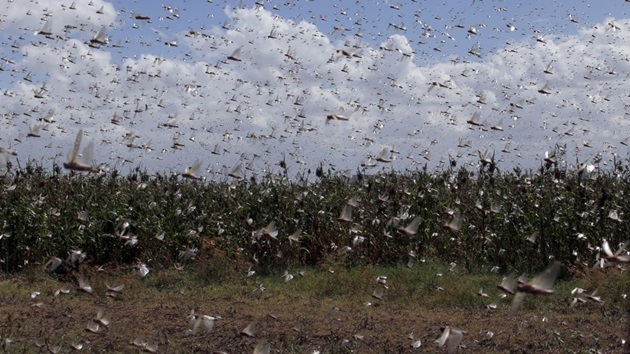(NEW YORK) — Locust outbreaks, a visual often used in entertainment to signify an upcoming apocalypse, could worsen as global temperatures continue to climb, according to new research.
Far-reaching, synchronized desert locust outbreaks are strongly coupled to climate change in the last several decades, a study published Wednesday in Science found.
Desert locusts can migrate long distances, threatening crops in regions such as North Africa, the Middle East and South Asia, the researchers said. Patterns of wind and extreme rain — severe weather events that are intensifying and becoming more frequent with climate change — may be contributing to more widespread locust outbreaks, according to the researchers, who analyzed 35 years of locust sightings and climate data.
Since these weather events are forecast to intensify in a warming climate, scientists are predicting higher risks for concurrent outbreaks of desert locusts, the paper found.
Researchers calculate that about 80 million locusts are capable of devouring enough cropland to supply food for 35,000 people, which could contribute to food security and famine in the long term, according to the study.
Locust outbreaks are the most severe in a small number of regions. Ten of the 48 countries listed in the United Nations’ Locust Hub experience 82.5% of total locust outbreaks, including Morocco, Kenya, Niger, Yemen and Pakistan, the researchers found.
Arid regions that experienced sudden extreme rains were most vulnerable to isolated locust outbreaks, according to the paper.
In addition, concurrent wind and flood inundation patterns modulated synchronized outbreaks across these regions, and El Niño events were strongly coupled to locust abundance and spatial extent, the researchers said.
New locust hot spots that could emerge due to warming temperatures include Iran, Afghanistan, Turkmenistan and west India, according to the paper.
“These regions will also face an elevated risk of locust abundance, making it increasingly difficult to prevent and control locust outbreaks in a changing climate,” the authors wrote.
The researchers advised that international cooperation will be crucial to aid endemic locust control and prevent global locust plagues.
Copyright © 2024, ABC Audio. All rights reserved.












